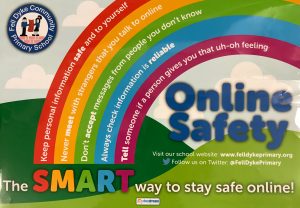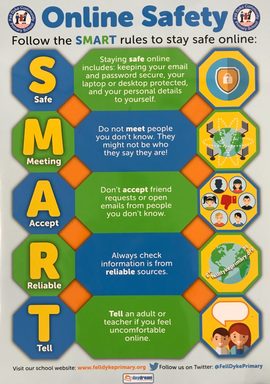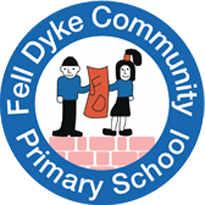Online Safety
Parents' online safety newsletters:
- Please check the Newsletters section of our website for up-to-date online safety newsletters.
At Fell Dyke we are very passionate about keeping our children, parents/carers and community safe online. During every school year, we deliver age-appropriate Online Safety lessons to all children as part of our Computing Curriculum in the Autumn Term.
At Fell Dyke, we also engage with Online Safety Day as well as being proactive with any Online Safety issues and incorporating them into our PSHE lessons, where appropriate.
Our SMART Online Safety Posters
As part of an in-school competition, the children had to design their own Online Safety poster with our SMART rules on them. The winner from each Key Stage was able to see their amazing poster professionally published.
Here are our two winning posters.


Managing Screen Time
There are a range of tools available to help you manage screen time:
Remember to model taking regular breaks from your screens.
What we do in school to support Online Safety:
We work closely with the NSPCC who deliver workshops about Online Safety to: staff, children and parents.
Click here to visit the website.
Video Games – advice for parents
Children love to play video games, but there are some risks involved. The two main areas of concern are:
- Children experiencing violent or sexual content beyond their age.
- Children playing online with strangers and either experiencing inappropriate language, or being groomed.
The PEGI ratings should help you decide what is appropriate for your child.
PEGI 18
The adult classification is applied when the level of violence reaches a stage where it becomes a depiction of gross violence and/or includes elements of specific types of violence. Gross violence is the most difficult to define since it can be very subjective in many cases, but in general terms it can be classed as the depictions of violence that would make the viewer feel a sense of revulsion.
PEGI 16
This rating is applied once the depiction of violence (or sexual activity) reaches a stage that looks the same as would be expected in real life. More extreme bad language, the concept of the use of tobacco and drugs and the depiction of criminal activities can be content of games that are rated 16.
PEGI 12
Videogames that show violence of a slightly more graphic nature towards fantasy character and/or non graphic violence towards human-looking characters or recognisable animals, as well as videogames that show nudity of a slightly more graphic nature would fall in this age category. Any bad language in this category must be mild and fall short of sexual expletives.
Further advice is available from www.askaboutgames.com which will also provide advice on setting parental controls on games consoles to help ensure that play is safe for children.
USEFUL WEBSITES:
Have a look at some of the advice provided on these key websites – if you are a parent, a grandparent, an auntie, uncle……
- https://beinternetlegends.withgoogle.com/en_uk/parents/
- http://www.internetmatters.org/controls/interactive-guide/ (set up parental controls)
- http://parentzone.org.uk
- https://parentzone.org.uk/order-your-free-vodafone-digital-parenting-magazine
- http://www.internetmatters.org/controls/interactive-guide/
- https://www.thinkuknow.co.uk
- https://www.nspcc.org.uk/preventing-abuse/keeping-children-safe/online-safety/
- http://www.kidsmart.org.uk
- http://www.bbc.co.uk/newsround/13910067
- http://www.saferinternet.org.uk
- http://www.childinternetsafety.co.uk
- https://support.google.com/youtube/answer/2802272?hl=en-GB&ref_topic=2803240
- http://www.saferinternet.org.uk/safety-tools/youtube
- https://www.ceop.police.uk
Where can I go to get support to help keep my child safe online?
There is a lot of support available to keep your child safe online. Below are some useful links to help parents and carers:
Thinkyouknow (advice from the National Crime Agency to stay safe online)
Internet matters (support for parents and carers to keep their children safe online)
Parent info (support for parents and carers to keep their children safe online)
LGfL (support for parents and carers to keep their children safe online)
Net-aware (support for parents and careers from the NSPCC)
